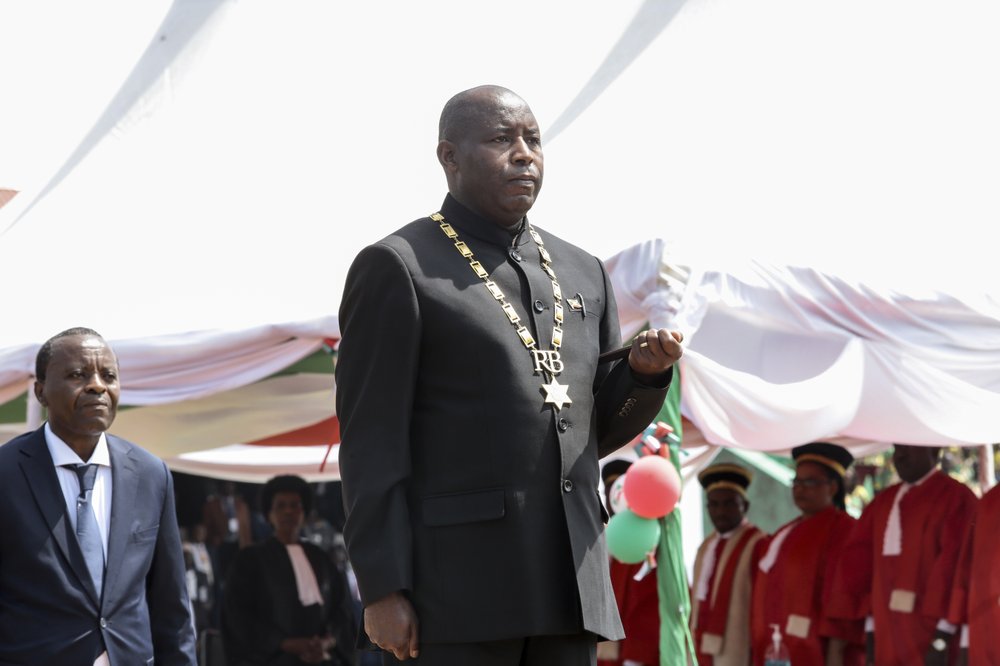
New Burundi leader talks up rights but rejects ‘outsiders’

Burundi’s new president upon his swearing-in Thursday declared that his rule will respect human rights but he warned that “outsiders should not dictate what to do.”
President Evariste Ndayishimiye took power two months early after the abrupt death of his predecessor, whose 15-year rule ended in deadly repression and a sharp rejection of outside scrutiny. Now the country waits to see if more of that will follow.
“Burundians should feel free to speak out. Burundians should be able to listen to each other, but outsiders should not dictate what to do,” Ndayishimiye said, and he accused colonizers of introducing social divisions.
“All Burundians are equal before the law,” the new president said. He invited those in exile to return and take part in building a new Burundi, and he said his government is ready to resume talks with all other political groups to reach a peaceful solution: “Nothing can be impossible because we believe in democracy.”
The 52-year-old Ndayishimiye won the May election as the ruling party candidate and was set to take office in August, but the death of Pierre Nkurunziza from what the government called a heart attack threw the East African nation into uncertainty.
Ministers turned to the constitutional court, which said the president-elect should be sworn in as soon as possible. The court earlier had rejected a challenge to the election results by opposition leader Agathon Rwasa, who alleged irregularities.
No heads of state of other East African countries attended the swearing-in.
With little sign of face masks or social distancing at Thursday’s ceremony, it appeared there was no immediate change in the government’s belief that divine protection would largely suffice for the coronavirus. That’s despite suspicion that Nkurunziza died of COVID-19.
Some countries and human rights groups expressed hope that the new president, an ally of Nkurunziza, might break with certain ways of his predecessor. South Africa in a statement said that “President (Cyril) Ramaphosa looks forward to working with President Evariste Ndayishimiye as he leads the people of Burundi to a better life.”
The U.S. State Department noted the peaceful transfer of power and urged the new government to “include a broad representation of political stakeholders; to release members of political parties, civil society, and journalists arbitrarily arrested for election-related activities; and to investigate and pursue accountability for allegations of voter intimidation.”
Amnesty International called on Ndayishimiye to rein in the Imbonerakure youth wing of the ruling party, accused of killings and other abuses, and urged the immediate freeing of imprisoned journalists and others jailed for exercising their human rights.
Ndayishimiye in his speech Thursday said that “Burundians who committed crimes should face the law.”
The rights group also urged Burundi’s new leader to investigate the deadly violence that followed Nkurunziza’s decision in 2015 to pursue a third term, which many called unconstitutional.
The United Nations human rights office reported more than 300 extrajudicial killings during the turmoil and was later kicked out of the country after outgoing U.N. rights chief Zeid Ra’ad al-Hussein called Burundi one of the “most prolific slaughterhouses of humans in recent times.”
Burundi’s government has denied allegations it targets its people, calling them malicious propaganda by dissidents. Angered by scrutiny, it became the first country to withdraw from the International Criminal Court.
“Evariste Ndayishimiye has a chance to improve Burundi’s appalling human rights record,” said Deprose Muchena, Amnesty’s director for Eastern and southern Africa. “We urge President Ndayishimiye to end the repression that characterized the previous government’s tenure.”






